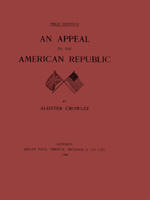100th
MP

|
THE
100th
MONKEY
PRESS |
|
|
|
Limited Editions by Aleister Crowley & Victor B. Neuburg |
|
Bibliographies |
|
Download Texts
»
Aleister
Crowley
WANTED !!NEW!!
|
|
AN APPEAL TO THE AMERICAN REPUBLIC |
|
Image Thumbnails |
||||||||||||||||
|
Title: |
An Appeal to the American Republic. |
|
||||||||||||||
|
Variations: |
|
|||||||||||||||
|
Publisher: |
Kegan Paul, Trench, Trübner & Company, Ltd.3 |
|||||||||||||||
|
Printer: |
Chiswick Press: Charles Whittingham and Co., Tooks Court, Chancery Lane, London.1 |
|||||||||||||||
|
Published At: |
London.1 |
|||||||||||||||
|
Date: |
December 1899. [Around November 1899, Crowley arranged to have this book published.5 Bound books were sent to reviewers in December 1899.7] |
|||||||||||||||
|
Edition: |
1st Edition. |
|||||||||||||||
|
Pages: |
12.1 |
|||||||||||||||
|
Price: |
||||||||||||||||
|
Remarks: |
Crowley was disappointed with Kegan Paul's management of his book sales and closed his account with them in May of 1904. Between 1902 and 1904, Kegan Paul had not managed to sell even one copy of An Appeal to the American Republic.6 |
|||||||||||||||
|
Pagination:2
|
|
|||||||||||||||
|
Contents: |
|
|||||||||||||||
|
Author’s Working Versions: |
|
|||||||||||||||
|
Other Known Editions: |
|
|||||||||||||||
|
Bibliographic Sources: |
|
|||||||||||||||
|
Comments by Aleister Crowley: |
My Appeal to the American Republic was begotten of a pleasant journey with two Americans from Geneva to Paris. The poem is still popular, though from time to time one has to change "The Lying Russian cloke his traitor head" to "Prussian", and so on. — The Confessions of Aleister Crowley. New York, NY. Hill and Wang, 1969. Page 189. ______________________________
From early
boyhood my imagination had been excited by accounts of the Great
Fair at Nijni Novgorod. Finding "the time and the place and the
loved one all together", at the cost of a slight effort, I
decided to trot off and see "The Fun of the Fair", by which
title I called the poem in which I describe my excursion. The
way in which I wrote it is, I imagine, unique in literature. I
wrote down in heroic couplets every incident of the adventure
exactly as it occurred and when it occurred. The only variation
is that occasionally I permit myself to exaggerate the facts (as
in enumerating the races of men whom I met) when the spirit of
humour takes charge. — The Confessions of Aleister Crowley. New York, NY. Hill and Wang, 1969. Page 716-717. ______________________________
But the facts were less enthralling. The professor had the great German gift of Being Always Right. My task was simplified; I had merely to keep on telling him how very right he was. He soon ceased to gauge the temper of the community correctly, began to lay down the law instead of arguing with moderation and good sense, was hardened in arrogance by opposition, and became as violent and stupid on his side as our own chosen propagandists were on ours. My meat! But I am overrunning myself. My immediate problem was to confirm Viereck in his conviction that I was pro-German. There was a very serious snag in the English Review for November 1914. There was a poem of mine called "An Appeal to the American Republic" inviting an Anglo-American alliance. This poem having been written in 1898, I had had to alter "the traitor Russian" to "the traitor Prussian", to suit the political kaleidoscope. Fortunately I had no difficulty in persuading Viereck that this action was in the nature of camouflage, designed to exploit the stupidity of the British public in general and Austin Harrison in particular. His knowing Mr. Austin Harrison made this easier. But personally I was so terribly English! My accent betrayed me as his did Peter. My clothes were obviously Savile Row. I had not even taken the precaution to be sufficiently un-English to pay for them. I clutched at the straw of my name. From the myths of antiquity looms a phantom Crowley somewhere near Kilkenny where the cats come from, and though my particular Crowleys have been mercifully well-behaved in England since the bishop of that name who published his naughty epigrams in the time of Queen Elizabeth, there are lots of Crowleys in America who come direct from Ireland. — The Confessions of Aleister Crowley. New York, NY. Hill and Wang, 1969. Page 750. |
|||||||||||||||
|
Reviews: |
The meaning of Mr. Crowley's high-sounding appeal to the Western Republic seems to be, “For godsake, let us—Britain and America—join hands as allies, and we shall make the world, or the unfriendly part of it, tremble!” Hear how he beats the big drum:—
“The fire of love no waters shall devour; The faith of friendship stands the shocks of time; Seal with your voice the triumph of this hour, Your glory is our glory and our power, Alliance of one tongue, one faith, one clime! Seal and clasp hands: and let the sea proclaim
Friendship
of righteous fame,
Thus he goes on for thirty-five stanzas, printed on quarto pages. He requests America to forget her “fools,” as we have forgotten their “words,” and to join our “worlds” in “one amazing net of empire and dominion” till one particular country stands aghast and clokes its traitor head. Then he says—
“The traitors and the people and the kings That love not righteous things, They shall behold our wrath, and finds our anger stings.'
And again—
“What matter that some strive to waken hate, Traitors to either State, Hang them in chains! Our way to freedom cannot wait!”
That is fine language for a man who, on the whole, is in favour of peace. This is how he concludes, in addressing the Republic :—
“O child of freedom, thou are very fair! Thou hast white roses in thy eager breast, The scent of all the South is in thy hair, Thy lips are fragrant with the blossoms rare Blown under sea waves when the white wings rest! Come to our warrior breast, when victory Sits passionate and free— Ring out the wild salute! Our sister over sea!”
The first lines in that stanza are in the style of Solomon's Song; the rest have the tone of a rhymer who used to be described as “Big Bow-Wow.” —The Glasgow Herald, 4 January 1900. ______________________________
Mr. Aleister Crowley’s APPEAL TO THE AMERICAN REPUBLIC (Kegan Paul, (6d) fairly represents his more dedicatory and laudatory manner. His stanzas march resoundingly and there is no lack of energy about them, but politically they mean too much and poetically they mean too little. France, we gather, is to retreat and Russia step aside, and all the world to keep silence, while England and America join hands and proceed wrathfully down the ages amid various phenomenal manifestations of delight on the part of earth and sea and sky. A superfluity of windy imagery gives to the whole poem an air of bravado which is consistent neither with the spirit of the “appeal” nor with the self-contained attitude of Great Britain at the present moment. There is too much about splendid kissing and fervid handclasping and delicious smiling, and we do not like “fangéd pen.” —Literature, 20 January 1900. ______________________________
Nothing remains for me to say of the orthodox poetry the war has provoked. The worst has been said and the worst is true. In the" English Review" Mr. Aleister Crowley addresses an Ode to America, from which one would suppose that that sordid continent has become for Mr. Crowley one of Swinburne's idealised girl harlots. Did anybody ever hear such language as this addressed to a continent of Yankees intent on capturing German trade in South America while England holds up German shipping at her own cost?
O child of freedom, thou art very fair! Thou hast white roses on thy eager breast; The scent of all, the South is in thy hair: Thy lips are fragrant—
No, I cannot bring myself to copy out more of the patchouli. R. H . C. —The New Age, 8 October 1914. |
|||||||||||||||


